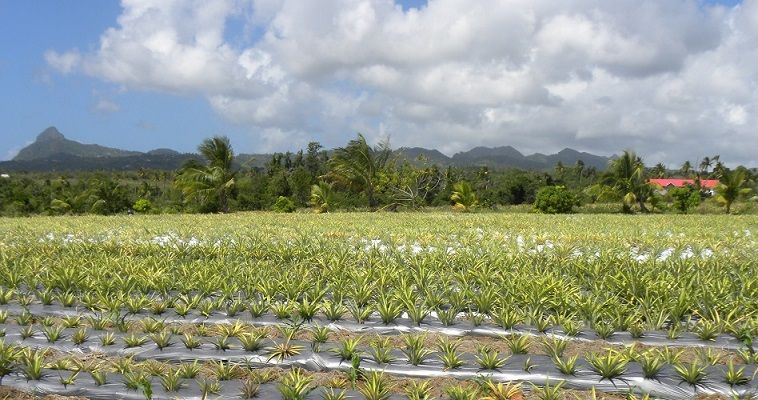Preventing the propagation of invasive agricultural produce in the Eastern Caribbean
OECS Media release
USDA/APHIS, the OECS Commission and Saint Lucia authorities are working together to implement the "Don’t Pack a Pest Outreach Programme". The programme provides a platform for participating countries to increase the traveling public’s awareness of the risks associated with carrying food and agricultural items throughout the region and is an essential component of safeguarding agriculture and natural resources.
It is suggested that 98% of the entry of pests results from passenger traffic, which has been on an upward trend over the years, given the growth of the tourism industry and an increase in regional travel. With increased activities in the trade and tourism sector in the region, the risk of introducing potential invasive species also remain a major concern and raises a question on the institutional and technical capacities to control and manage pests to protect the environment and ensure the economic wellbeing of citizens.
Acknowledging the need to address that issue, a delegation from the United States Department of Agriculture's Animal Health Inspection Service (USDA/APHIS) paid an official visit to the Director General of the OECS Commission Dr. Didacus Jules this week to discuss the implementation of the Don’t Pack a Pest Outreach Programme and the continued collaboration with the OECS on matters related to regional plant health safeguarding activities such as export certification, the regional plant quarantine principles and procedure training course and the exchange of electronic phytosanitary certificates through the International Plant Protection Convention (IPPC) electronic hub.
Dennis Martin, Director of Safeguarding Initiative for the Greater Caribbean and Renita Sewsaran, Agricultural Scientist, presented the Programme which seeks to draw traveller’s attention on the risks of transporting agricultural produce which may harbour pests in countries of the Eastern Caribbean.
The Director of the OECS Commission Dr. Didacus Jules commended the assistance of USDA/ APHIS in building capacity to protect the region from pests over the past ten years and expressed full support with regards to this new sensitization campaign.
I wish to further note the pioneering work done in support of our science-based systems to enhance regional biosecurity and the strengthening of regional and national pest mitigation activities to facilitate and enhance international trade of agricultural commodities through a collaborative process. We strongly support the traveler outreach programme and would like to see the programme implemented in all ports of the OECS. We look forward to continued collaborative working relationship with the USDA/APHIS that will redound to an improved quarantine and pest management infrastructure in the region”. Director General of the OECS said.
As a matter of fact, USDA/APHIS and the OECS Commission have been maintaining a 10 year working relationship under which major projects advancing the management of pests have been implemented:
-
The annual training of plant quarantine officers at the University of the West Indies
-
The training in pest surveillance and the development of a manual for use by technicians
-
The training in pest risk analysis and pest prioritization and the establishment of risk analysis labs in Saint Lucia, Dominica and Saint Vincent and the Grenadines
-
The training in the development of a national pest list for the facilitation of a regional one and the development of a manual for technicians
-
The supply of digital imaging microscopes linking the region to the Caribbean Pest Diagnostic Network
Besides the aforementioned initiatives, Director General Dr. Didacus Jules further emphasized the urgency for assistance to enhance export certification and inspection services, develop an electronic phyto certification system, support and mentorship to countries that are not equipped with the pest risk analysis laboratory facilities and to implement a phytosanitary capacity evaluation and strategy for the Eastern Caribbean.
These areas are new opportunities to deepen the existing partnership between both organisations.
The delegation of USDA/APHIS and the OECS Commission furthered this official visit to other key stakeholders whose participation will be decisive for the successful implementation of the Don’t Pack a Pest Outreach Programme in St. Lucia. Among them were the Ministry of Agriculture and the Ministry of Health of the Government of Saint Lucia, Research, Plant and Animal Quarantine, Saint Lucia Air and Sea Ports Authority (SLASPA) and the Customs & Excise Department.
 Director General of the OECS Commission Dr. Didacus Jules and Director of USDA/APHIS Safeguarding Initiative for the Greater Caribbean Dennis Martin.
Director General of the OECS Commission Dr. Didacus Jules and Director of USDA/APHIS Safeguarding Initiative for the Greater Caribbean Dennis Martin. USDA/APHIS Agricultural Scientist Renita Sewsaran, OECS Agriculture Unit Programme Officer George Alcee, Director General of the OECS Commission Dr. Didacus Jules and Director of USDA/APHIS Safeguarding Initiative for the Greater Caribbean Dennis Martin.
USDA/APHIS Agricultural Scientist Renita Sewsaran, OECS Agriculture Unit Programme Officer George Alcee, Director General of the OECS Commission Dr. Didacus Jules and Director of USDA/APHIS Safeguarding Initiative for the Greater Caribbean Dennis Martin. USDA/APHIS Agricultural Scientist Renita Sewsaran, OECS Agriculture Unit Programme Officer George Alcee, Director General of the OECS Commission Dr. Didacus Jules and Director of USDA/APHIS Safeguarding Initiative for the Greater Caribbean Dennis Martin.
USDA/APHIS Agricultural Scientist Renita Sewsaran, OECS Agriculture Unit Programme Officer George Alcee, Director General of the OECS Commission Dr. Didacus Jules and Director of USDA/APHIS Safeguarding Initiative for the Greater Caribbean Dennis Martin. USDA/APHIS Agricultural Specialist Renita Sewsaran, OECS Agriculture Unit Programme Officer George Alcee, Director General of the OECS Commission Dr. Didacus Jules and Director of USDA/APHIS Safeguarding Initiative for the Greater Caribbean Dennis Martin.
USDA/APHIS Agricultural Specialist Renita Sewsaran, OECS Agriculture Unit Programme Officer George Alcee, Director General of the OECS Commission Dr. Didacus Jules and Director of USDA/APHIS Safeguarding Initiative for the Greater Caribbean Dennis Martin.





